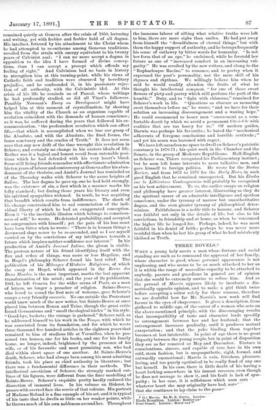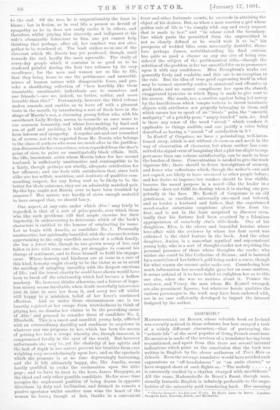THREE NOVELS.*
WHEN a young lady meets a man whose fortune and social standing are such as to command the approval of her family, whose character is good, whose personal appearance is not unpleasing, and who seems to be as much attached to her as it is within the range of masculine capacity to be attached to anybody, parents and guardians in general are of opinion that she would be extremely unwise to refuse him. And as the perusal of Marcia appears likely to inculcate a dia- metrically opposite opinion, and to make a girl think twice before accepting a suitor solely for these reasons, therefore we are doubtful how far Mr. Norris's new work will find favour in the eyes of chaperones. It gives a description, from girlhood to middle age, of the career of a woman who acts on the above-mentioned principle, with the discouraging results that incompatibility of taste and character leads speedily to estrangement between her and her husband; that the estrangement increases gradually, until it produces mutual exasperation ; and that the yoke binding them together becomes at last intolerable. In point of age there is no great disparity between the young couple, but in point of disposition they are as far removed as May and December. Eustace is conscientious, sincere, and capable of true love in his own cold, stern fashion, but is unsympathetic, rigid, formal, and outwardly unemotional; Marcia is vain, frivolous, pleasure- loving, and too purely egotistical to be really fond of any one but herself. In his case, there is little doubt of his having a heart lurking somewhere in his inmost recesses, even though he does not manage to show it, and his fault is lack of sym- pathy ; in her case, it is selfishness which soon eats whatever heart she may originally have had, notv--- that she continues to lay claim to the posse,' • (L) Marcia. By W. E. Norris. London • - Rhoda Broughton. London Bentley an"
Esme Stuart. London : Hurst and 1"
to the end. Of the two, he is unquestionably the least to blame ; but in fiction, as in real life, a person so devoid of sympathy as he is, does not easily excite. it in others, and therefore, whilst pitying him sincerely, and indignant at his wife's abominable behaviour to him, one yet cannot help thinking that perhaps, after all, her conduct was not alto- gether to be wondered at. The book strikes us as one of the cleverest which Mr. Norris has yet produced, though, until towards the end, hardly the most agreeable. The study of every-day people which it contains is so good as to be rendered painful during the first two volumes by its very excellence ; for the men and women are so like to life, that they bring home to one the pettinesses and unworthi- nesses of human nature with disagreeable force, and pro- voke a shuddering reflection of "how horribly like these unamiable, unestimable individuals are to ourselves and our friends !—are we, indeed, no better, nobler, and more loveable than this?" Fortunately, however, the third volume makes amends, and enables us to leave off with a pleasant taste in the mouth, by introducing a sort of fresh hero in the shape of Mareia's son, a charming young fellow who, with his sweetheart Lady Evelyn, serves to reconcile us once more to our common humanity, and whose love-making by land and sea, at golf and yachting, is told delightfully, and arouses a keen interest and sympathy. A regular out-and-out scoundrel is, of course, not to be expected from Mr. Norris, who belongs to the class of authors who seem too much alive to the justifica- tion discoverable for even crimes, when regarded from the doer's point of view, to paint an unmitigatedly black villain. Still, the idle, inconstant artist whom Marcia takes for her second husband, is sufficiently unattractive and contemptible to be a fairly, though perhaps not wholly, adequate retribution for her offences ; and one feels with satisfaction that, since both alike are too selfish, worthless, and destitute of qualities com- manding respect, for any living soul to be likely to be the better for their existence, they are an admirably matched pair. By-the-bye, ought not Marcia ever to have been troubled by remorse ? Her nature was hardly of stern enough material to have escaped that, we should fancy.
One aspect, at any rate, under which Alas ! may fairly be regarded, is that of a sort of prize-puzzle, over which those who like such problems will find ample exercise for their Ingenuity, in endeavouring to determine which of the book's characters is entitled to the honour of originating its name. Let us begin with Amelia, as candidate No. 1. Personally unattractive, but spiritually beautiful, with the obscure heroism appertaining to the only unselfish member of a selfish family, she has a fiance who, though he has grown weary of her, and fallen in love with some one else, yet struggles to conceal his change of sentiment, and to force himself to fulfil his engage- ment. Where honesty and kindness are at issue in a case of this kind, honesty ought clearly to be the victor so as to avoid the sacrilege of mingling unreality with the deepest emotions of life ; and the truest charity he could have shown would have been to break off the relationship which had become a hollow mockery. He, however, thinks otherwise, and a future of hope- less misery seems inevitable, when death mercifully intervenes just in time to save her from it, and carry her off whilst still happy in a mistaken belief of her lover's continued affection. And as under these circumstances one is too heartily rejoiced at her escape from wretchedness to think of pitying her, we dismiss her claims to be the provoking cause of Alas ! and proceed to consider those of candidate No. 2, Elizabeth. This is a sweet and unselfish young lady, afflicted with an extraordinary ductility and readiness to acquiesce in whatever any one proposes to her, which has been the means of getting her into a scrape whereby she, though innocent, is compromised fatally in the eyes of the world. But however unfortunate she may be, yet the elasticity of her spirits and the lack of depth in her nature prevent her troubles from ever weighing very overwhelmingly upon her; and as the spectacle which she presents is at no time depressingly harrowing, and she is left ultimately happy, she, like Amelia, seems hardly qualified to evoke the exclamation upon the title- page ; and we have to turn to the hero, James Burgoyne, as the third and only other possible candidate, He for some time occupies the unpleasant position of being drawn in opposite directions by duty and inclination, and doomed to remain a passive spectator whilst another man wins the heart of the woman he loves; though at last, thanks to a convenient fever and other fortunate events, he succeeds in attaining the object of his desires. But, as when a man marries a girl whose golden rule of life is " to comply with any and every request that is made to her," and " in whose mind the boundary- line which parts the permitted from the unpermitted is not so clearly defined as he would wish it to be," his prospects of wedded bliss seem necessarily doubtful, there- fore perhaps James, notwithstanding his final success, has quite as good a chance as any one else of being con- sidered the subject of the problematical title,—though the solution of the problem is far too unsettled for us to pronounce upon it with any confidence. - Miss Broughton's works are generally lively and readable, and this one is no exception to the rule. But the idea of true grief expressing itself in what may be termed unworthy antics, is unnatural and offensive to good taste, and we cannot compliment her upon the absurd, exaggerated hysterics in which Bynis is made to give vent to his sorrow. She needs, too, a caution against being led astray by the fancifulness which tempts writers to invest inanimate objects with attributes not properly belonging to them, and which causes her to speak of an " ironic " palm, the " uncouth malignity" of a prickly-pear, " angry-handed" rain, &c. And is there any sense of the word " streak " which renders it applicable to things audible, and can justify a voice being described as having a " streak " of satisfaction in it P In Kestell of Greystone, we have a painstaking, well-inten- tioned story, which is not without cleverness and merit in the way of observation of character, but whose author. has com- mitted the signal error of imagining that a plot too slight to sup- port more than one volume satisfactorily,, can be made to bear the burden of three. Concentration is needed to give the work vigorous life ; there should be fewer descriptions of scenery, and fewer wise reflections which, though the writer's own and not copied, are likely to have occurred to other people before; and b er desire to improve her readers should he less visible, because the moral purpose in a novel--like the leader in a tandem—does not fulfil its destiny when it is staring one per- petually in the face. Mr. Kestell of Greystone is an old gentleman, so excellent, universally esteemed and beloved, and so tender a husband and father, that the experienced novel-reader entertains suspicions about him from the first, and is not in the least surprised to discover even- tually that his fortune had been acquired by a felonious appropriation of somebody else's title-deeds. One of his daughters, Elva, is the clever and beautiful heroine whose love-affair with the reviewer by whom her first novel was criticised is the chief feature in the book. And the other daughter, Amice, is a somewhat mystical and supernatural young lady, who is a sort of thought-reader not requiring the personal presence of those whose thoughts she reads ; who wishes she could be like Catherine of Sienna; and is haunted by a conviction of her father's gold being under a curse, though for what reason she cannot quite make out. Considering how much information ber second-sight gave her on some matters, it seems unkind of it to have failed to enlighten her as to this one also, when she was so anxious about it. Fenner the reviewer, and Vicary, the man whom Mr. Kestell wronged, are also prominent figures ; but whatever heroic qualities the various personages in the work may have been endowed with, are in no case sufficiently developed to impart the interest designed by the author.







































 Previous page
Previous page